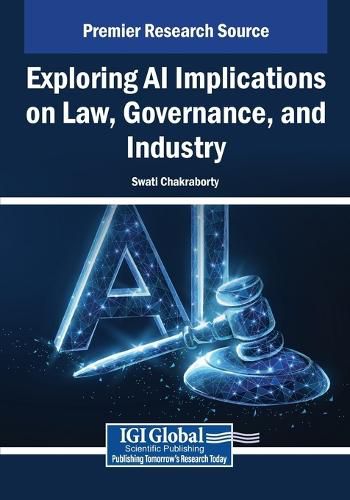Readings Newsletter
Become a Readings Member to make your shopping experience even easier.
Sign in or sign up for free!
You’re not far away from qualifying for FREE standard shipping within Australia
You’ve qualified for FREE standard shipping within Australia
The cart is loading…






This title is printed to order. This book may have been self-published. If so, we cannot guarantee the quality of the content. In the main most books will have gone through the editing process however some may not. We therefore suggest that you be aware of this before ordering this book. If in doubt check either the author or publisher’s details as we are unable to accept any returns unless they are faulty. Please contact us if you have any questions.
The evolution of artificial intelligence (AI) reshapes modern society, presenting complex challenges and opportunities across law, governance, and industry. As AI systems are integrated into decision-making processes, they challenge traditional frameworks of accountability, fairness, and transparency. In law, questions about liability, privacy, and human rights take on new meanings as AI technologies are used to automate legal analysis, predict outcomes, and assist in judicial decision-making. In governance, AI has the potential to enhance public administration through efficient systems, and raises concerns about surveillance, bias, and the erosion of civil liberties. Industries are witnessing transformative shifts as AI drives innovation, optimizes operations, and redefines workforce dynamics, introducing new ethical dilemmas and regulatory gaps. As these technologies advance, it is essential to understand their broader societal impacts and develop frameworks that ensure they are harnessed in beneficial ways. Exploring AI Implications on Law, Governance, and Industry examines the integration of intelligent technologies into business and government sectors. It offers solutions to address challenges in ethics, social justice, and civil rights. This book covers topics such as business strategy, environmental science, and digital technology, and is a useful resource for computer engineers, policymakers, business owners, academicians, researchers, and scientists.
$9.00 standard shipping within Australia
FREE standard shipping within Australia for orders over $100.00
Express & International shipping calculated at checkout
This title is printed to order. This book may have been self-published. If so, we cannot guarantee the quality of the content. In the main most books will have gone through the editing process however some may not. We therefore suggest that you be aware of this before ordering this book. If in doubt check either the author or publisher’s details as we are unable to accept any returns unless they are faulty. Please contact us if you have any questions.
The evolution of artificial intelligence (AI) reshapes modern society, presenting complex challenges and opportunities across law, governance, and industry. As AI systems are integrated into decision-making processes, they challenge traditional frameworks of accountability, fairness, and transparency. In law, questions about liability, privacy, and human rights take on new meanings as AI technologies are used to automate legal analysis, predict outcomes, and assist in judicial decision-making. In governance, AI has the potential to enhance public administration through efficient systems, and raises concerns about surveillance, bias, and the erosion of civil liberties. Industries are witnessing transformative shifts as AI drives innovation, optimizes operations, and redefines workforce dynamics, introducing new ethical dilemmas and regulatory gaps. As these technologies advance, it is essential to understand their broader societal impacts and develop frameworks that ensure they are harnessed in beneficial ways. Exploring AI Implications on Law, Governance, and Industry examines the integration of intelligent technologies into business and government sectors. It offers solutions to address challenges in ethics, social justice, and civil rights. This book covers topics such as business strategy, environmental science, and digital technology, and is a useful resource for computer engineers, policymakers, business owners, academicians, researchers, and scientists.